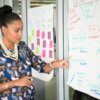In the dynamic landscape of education, the benefits of school residential trips extend far beyond the thrill of adventure. As students embark on these immersive journeys, the impact on their academic performance becomes increasingly evident.
Let’s explore how these experiences contribute to the holistic development of students, leaving an indelible mark on their educational journey.
Engaging Education Beyond Classroom Walls
School residential trips offer a departure from traditional classroom settings. The hands-on, experiential learning opportunities provided during these adventures stimulate intellectual curiosity and engagement.
Whether exploring historical sites, conducting field experiments, or immersing in cultural experiences, students connect theoretical knowledge to real-world applications, fostering a deeper understanding of their academic subjects.

Photo by Hans-Peter Gauster.
Building Stronger Social Bonds
The camaraderie developed during residential trips for schools, like the unforgettable adventures organised by PGL, spills over into the academic realm. Collaborative activities, teamwork challenges, and shared experiences create a sense of unity among students.
This enhanced social cohesion often translates into improved classroom dynamics, with students more willing to collaborate on projects, participate in discussions, and support each other’s academic pursuits.
Nurturing Personal Growth and Confidence
Stepping outside comfort zones is a hallmark of residential trips. Whether conquering a high ropes course, navigating challenging terrain, or presenting in front of peers, students develop resilience and confidence.
These newfound personal attributes often translate into increased participation, risk-taking in academic endeavours, and a willingness to embrace challenges within the classroom setting.
Connecting Classroom Lessons to the Real World
School residential trips bridge the gap between theoretical knowledge and real-world application. Students witness the practical relevance of what they learn in the classroom, making subject matter more tangible and relatable.
This connection to real-world scenarios often leads to a deeper retention of academic concepts, as students can draw upon their experiences to enhance their understanding.
Related Story: I Have Bigger Ideas for Teaching & People will Know About Them When I’m Ready: Meet Jennifer Emelife, Literature Teacher & Writer.
Fostering Independence and Critical Thinking
Away from the familiar surroundings of home, students are encouraged to make decisions independently, fostering a sense of responsibility. Whether planning daily activities, solving problems on the go, or navigating unfamiliar environments, these experiences nurture critical thinking skills.
The ability to think critically is a valuable asset in academic settings, enabling students to analyse information, make informed decisions, and approach challenges with a problem-solving mindset.
Enhanced Focus and Concentration
Exposure to the natural environment during residential trips has been linked to improved concentration and reduced mental fatigue. The break from routine and immersion in nature contribute to mental rejuvenation, allowing students to return to the classroom with increased focus and attentiveness.
This refreshed mindset can positively impact academic performance, especially during periods of intense study.
Creating Lasting Memories and Motivation
The memories forged during school residential trips linger long after the adventure concludes. These positive experiences become motivating factors for students, instilling a sense of purpose in their academic pursuits.
The anticipation of future trips or the recollection of past triumphs serves as a motivational anchor, encouraging students to stay committed to their studies and extracurricular activities.
Final Thoughts
In the tapestry of education, school residential trips weave threads of experiential learning, personal growth, and enhanced social dynamics. The impact on academic performance is not merely anecdotal; it is a tangible transformation that students carry with them into the classroom.
As schools continue to recognise the profound influence of these immersive experiences, the academic landscape stands to benefit from the well-rounded, confident, and engaged individuals that emerge from the tapestry of educational adventures.





